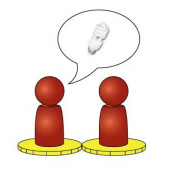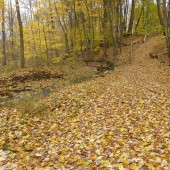
As sustainability educators and communication professionals consider various strategies to engage audiences with regard to household energy use, one option now seemingly available is to leverage social networks by encouraging people to share information with others they know. At the same time, we currently do not know enough about the potential spread of energy-related information in this fashion. Whether, when, or how people share energy-related information with peers or family members are crucial questions, for example. Using national survey data from U.S. residents (n=816), we predicted energy information sharing as a function of objective energy knowledge (measured using a factual energy knowledge index), perceived energy understanding, and demographic variables. Our analyses underscored the importance of assessing not only factual energy knowledge but also perceived understanding, as both are equally predictive of energy information sharing frequency (β=.11, p<.05, for objective knowledge and β=.11, p<.01 for perceived understanding). Number of children also predicted energy information sharing, β=.11, p<.01. We discuss the implications of these results for informal energy education efforts in the 21st century.
Continue ReadingPDF: BollmannandKunzandFrishknechtSpring2014 Key words: Sustainable Development, Systems Thinking, SYSDENE, multi-dimensional Learning Outcomes Learning Outcomes Enduring Understandings/Big Ideas: Before you even start with Sustainability Education, it is necessary to work on the attribution of significance of Sustainable Development (SD). Pupils, students, teachers or lecturers alike: they all need to recognize sustainability as something important and significant […]
Continue ReadingPDF:CirilloandHoylerSpring2014 Also see outside source for more information here Key Words: Sustainability Education, State of the Field, Shelburne Farms, Alternative Schools, Place-Based Education Education for sustainability (EFS) is a lens that considers environmental & ecological integrity, economic vitality, and social justice/equity. Building upon big ideas, such as systems-thinking, interdependence, and community, EFS uses […]
Continue ReadingPDF:AndresSpring2014 Key Words: Sustainability Education, State of the Field, EdTracks, Systems Thinking Learning Outcomes Enduring Understandings/Big Ideas: Systems thinking, interdependence, human/nature connections, the self and well-being, patterns of nature and of human systems; viable economies, social/equity concerns, stewardship, respect for nature’s limits; regeneration, intergenerational thinking, resilience thinking, Content Knowledge: Ecological economics, systems theory, […]
Continue ReadingAs part of Drexel’s EdD program for Educational Leadership and Change, students participate in a course focused on creativity and leadership. The outcome is to work in teams to conceptualize and redesign schools for the future based on the concepts of ecological and economic sustainability. This doctoral course engages learners in the process of studying creativity and prototyping as a process for rethinking the structure and function of schools.
Continue Reading
Sustainable design practices have become more prevalent in the fields of Civil and Construction Engineering Technology and traditional Civil Engineering. Therefore, educators must prepare the next generation of engineers with courses on sustainable engineering and incorporate sustainable topics into traditional engineering subjects. Such is the case at Youngstown State University where the first course in LEED (Leadership in Energy and Environmental Design) was taught Fall semester 2012. The course used the USGBC LEED Reference Guide for Green Building Design and Construction as the basis for learning. The students were asked to learn the aforementioned USGBC publication through traditional classroom lectures, case studies and projects. Each of the case studies and the final project used Problem and Project Based learning principles to allow the students to gain greater understanding of the material. The effectiveness of this was assessed using ETAC learning outcomes. This was done by choosing specific outcomes to be evaluated and then evaluating each assignment and test based on the outcomes which reflect what the students were supposed to learn. This paper describes the Problem and Project based methodology used and the approach to selecting the ETAC outcomes used to assess the student learning. Also discussed will be the process of setting up and analyzing the rubrics used to get meaningful data and results of the student learning.
Continue ReadingPDF:McClanahanSpring2014 Abstract: In this state of the field response, I suggest that Education for Sustainable Development (ESD) be considered a mindset that is necessary for teacher educators understand and incorporate into their daily business of educating our future teachers, regardless of grade level or content area. Key Words: Education for Sustainable Development, Education for Sustainability, […]
Continue ReadingPDF:PramodSpring2014 Key Words: Sustainability Education, State of the Field, Prescott College, Ph.D. Program in Sustainability Education The problems we are facing are linked. It is not a set of problems. It is a system of problems. Now it is time to look at the system of solutions. – Janine Benyus, Nobel Laureate Symposium, 2011. […]
Continue ReadingWhat distinguishes the approach? Trans-disciplinary thinking, the fact that it is a “Crisis Discipline”, the ethical imperative, the action orientation—these things come to mind. How do we know it is happening? This is where evaluation and assessment are really tough. We are after transformation. How do you assess a “turned soul”? This is difficult. And, especially when the change must be permanent and long-term. How do we assess this longitudinally? Is it just about behavior change? These are difficult questions that I continue to wrestle wit
Continue ReadingThis article focuses on defining the proficiencies new teachers need in order to be able to lead in―educating for sustainability‖ (EfS). Educating for sustainability involves teaching and learning collective problem solving skills to address critical environmental, economic, and social issues. This article addresses the essential elements of EfS (content knowledge, skills, behaviors, and dispositions) that need to be taught in teacher education programs so that new teachers can lead implementation of EfS with K-12 students. A set of five EfS proficiency areas are identified. For each proficiency area a brief rationale and literature review are provided, followed by traits of teacher education courses that develop the proficiency area. Evidence of these traits tells us when EfS is happening in pre-service teacher education programs. Alignment of each EfS proficiency area to national teacher InTASC Standards concludes each section.
Continue ReadingPDF: Simmons Bora JSE May 2014 Learning Outcomes Enduring Understandings/Big Ideas: NOTE: Much of the environmental literacy framework presented here is from Excellence in Environmental Education: Guidelines for Learning (K-12) (NAAEE 2010 – first published in 1999 and most recently revised in 2010) [http://resources.spaces3.com/89c197bf-e630-42b0-ad9a-91f0bc55c72d.pdf]. Other documents in the Guidelines for Excellenceseries are referenced when appropriate. […]
Continue ReadingPDF:SmithSpring2014 Key words: Sustainability Education, state of the field, place, community, problem-solving, action When trying to consolidate my thinking about sustainability education in preparation for a talk a few years ago, I asked myself two questions: What is sustainability? And what kinds of people seem most likely to help humanity move in that […]
Continue ReadingIn recent years, Co-Curricular Sustainability Programs (CoCSPs) have been established at many higher education institutions. However, few such programs have developed learning outcomes or assessment processes to measure the types of learning that are occurring within their programs. This case study creates synthesis between sustainability education and student leadership competencies and shares a place-based framework for designing and assessing learning outcomes. By utilizing learning outcomes and assessment processes, leadership educators can strengthen the effectiveness of their sustainability programs and facilitate transformational learning experiences for students across campus
Continue ReadingRather than outline my view of Education for Sustainability as such, I attempt here to address here a deeper frame of reference which helps underpin the nature and task of EfS in relation to achieving a more participative consciousness, essential for our times.
Continue ReadingIn order to inform humans of the knowledge of the environment and the relationship between humans and nature, it is necessary to introduce sustainability related knowledge to students and educators via education, as the first step toward global sustainability (Wheeler & Bijur, 2000). Education is a way, by which people may find whether their practices are sustainable or not, to inform the knowledge of sustainable practices. Education for sustainable development has been widely developed worldwide, but no research has been done to summarize education development associated with sustainability in China, which is the purpose of this article.
Continue ReadingPDF:WheelerJSESpring2014 Key Words: State of the Field; Sustainability Education, State of Washington, Standards WA State K-12 Integrated Environmental and Sustainability Standards Standard 1: Ecological, Social, and Economic Systems Students develop knowledge of the interconnections and interdependency of ecological, social, and economic systems. They demonstrate understanding of how the health of these systems determines the […]
Continue ReadingIn response to the hitherto unchallenged assumptions supporting a globalized economy, the Leadership for Sustainability Education (LSE) program, formerly Leadership in Ecology, Culture, and Learning, was developed as part of an emerging sustainability movement. This article highlights the favorable conditions that provided the context for the evolution of the LSE program, including organizational policies and practices at Portland State University, and a commitment to community-university partnerships that conveyed the University’s motto, “Let Knowledge Serve the City.” We discuss the potential that higher education has to transform practices and ways of thinking necessary for ecological sustainability and social justice. Following this overview, we outline the main elements of the LSE Master’s degree program, including the four key learning areas: self-understanding and commitment, systemic view of the world, bio-cultural relationships, and tools for sustainable change. Additionally, we describe the types of learning experiences and assessment strategies employed throughout the program. We conclude by sharing the key authors and thinkers who influence the program and coursework.
Continue ReadingFor the past seven years, I have been creating and facilitating professional development workshops focusing on Earth literacy and sustainability for faculty at Miami Dade College (MDC), Florida, the largest community college in the United States. With the support of the college’s Earth Ethics Institute, I organize a lunch and learn series called Wisdom Luncheons, oversee an organic campus garden project, facilitate workshops on sustainability education, and teach graduate classes focusing on sustainability, globalization, education, and Earth literacy for our faculty. 175,000 students currently attend MDC, so the potential to transform the community through education is enormous. It is no surprise then that ideas about sustainability education swirl through my head during most waking hours, and occasionally, they occupy my dreams as well.
Continue ReadingPlease post your comments below on our “state of the field” data matrix share: Recommend on Facebook Tweet this
Continue ReadingDear JSE….viewers? ……visitors? ….interactors?… Well, we know “readers” doesn’t work anymore, and, what I believe will come to be known as the “landmark” issue of JSE, finally fulfills that promise, as we enter into a new world of asking our audience to interact with a rich and, we hope, game-changing content in this, our “State […]
Continue Reading